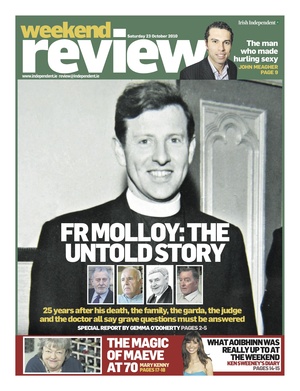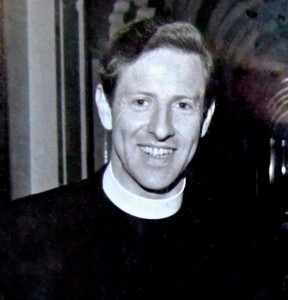[Conor Brady, former member of the Garda Síochána Ombudsman Commission (GSOC) and former editor of the Irish Times]
Mr Brady spoke to Seán O’Rourke on RTÉ Radio One last Friday in relation to the controversies surrounding the gardaí of late, but specifically about Sgt Maurice McCabe, Justice Minister Alan Shatter and Garda Commissioner Martin Callinan following Minister’s Shatter speech in the Dáil last Wednesday.
Conor Brady: “I think by and large the minister did well (in the Dáil) but I think, as you say, it’s, it’s, we have a kind of a Garda-free zone for a few days and it’s possibly time to stand back and take a look at where we are.”
Seán O’Rourke: “And, in regard to the way he outlined in very great detail, the complaint came in, it was, you know, it went initially to GSOC, there was a letter to the minister, certainly the file moved.”
Brady: “The file moved and he followed it through at every stage but, you know, very often in these statements and in these trails, investigations have to be evidence-led and evidence has got to be recorded and logged and very often what isn’t said and what isn’t detailed can be just as important as what is logged and what is said. I take a little, I differ from the minister in one point he made and I think it’s a significant point of emphasis. He talked about Sgt McCabe’s complaints about Garda activities in the, complaining about the conduct of policing in the Cavan area, in the Baileboro area where he was, where he was based as sergeant. And the minister stated quite rightly that GSOC did not appear, did not take any further action on the complaints of Sgt McCabe. Now what the minister said is GSOC did not appear to have felt it necessary to take any further action. And I don’t think that’s really telling the full story. It would be more accurate to say that GSOC felt it was not possible to take any further action.”
O’Rourke: “Why would that have been?”
Brady: “Well, because when the complaints came in, for example, we set down a number, we opened a public interest investigation. A number of very senior experienced officers from GSOC, former police detectives from outside of the State, along with one or two former gardaí themselves, working with GSOC, went to interview the witnesses in some of the cases that Sgt McCabe had complained about. And while the witnesses were quite willing to tell them what happened in some of these allegations of malpractice and neglect of duty, when it came to making statements they weren’t going to do that. So our officers had to go back to us and say ‘look you know, this woman has told us what happened, she’s quite prepared that we should know, but she’s not going to make a statement’.”
O’Rourke: “Are you talking about people who would have complained to the gardaí and that, in those instances, not enough had been done but in other words the complainant…”
Brady: “Some of the cases that Maurice McCabe was talking about, where he alleged neglect of duty by fellow gardaí, where he had alleged that guards were not doing the job that they were paid to do, the way they were doing it. And the, as I say, the, any investigation…”
O’Rourke: “So we’re talking about civilians not being willing to give the statements that were…”
Brady: “And indeed other gardaí not being willing to confirm details of complaints.”
O’Rourke: “And, so in that situation, were GSOC’s powers limited then? Were, is there no obligation on guards to provide information and to answer questions put forward and to cooperate with GSOC itself?”
Brady: “There are requirements that they should but it’s not, it’s not always easy to get the evidence of that either. All I’m saying is that the complaints made by Maurice McCabe, I think the minister has shown, yes, that there was a response by the bureaucracy, a response by the Garda authorities, a response by GSOC, a response by the Department of Justice but that doesn’t mean that Sgt McCabe’s complaints are not founded. What I’m saying is that rather than having it said that we didn’t find it necessary to go any further, my recollection of it is that we simply came up against a blank wall: evidence wasn’t there, people weren’t prepared to talk about things and in that situation you can’t take an investigation further.”
O’Rourke: “And there were some instances I think where GSOC itself recommended that disciplinary action be taken but the Commissioner, using his powers or his discretion chose not to – what did you think of that?”
Brady: “Well that again that is a further flaw I would suggest in the legislation and it is not mirrored in the legislation. For example, in Northern Ireland, if, if the Northern Ireland Police Ombudsman recommends disciplinary action be taken against a member of the PSNI then the Chief Constable doesn’t have an option in that and the same in England and Wales. If we stand back from all this, I think what we’re seeing here is a series of fissures, cracks, flaws, very deep flaws in the 2005 legislation. There are, we’ve seen, that effectively, the relationship between GSOC and the Garda Síochána is unsustainable, it’s bedevilled by mistrust. The whistleblower system has broken down and other flaws such as the one you now have just shown us, the legislation is really, it has failed to pass its first tests.”
O’Rourke: “Well that’s something that’s going to be the subject of amending legislation in the aftermath presumably of the two reports that are being worked on at the moment. But, going back to the exchanges in the Dáil, what about the insights fresh or otherwise that were given into the Commissioner’s behaviour, Garda Commissioner Martin Callinan. He insisted that he had directed Sgt Maurice McCabe to cooperate with the investigation on the penalty points controversy. McCabe insisted that that was not so. Alan Shatter seemed to accept that there was two sides to that story.”
Brady: “He did, he accepted that there were two sides to the story and it looks, it again I think the system can cover itself. But, at the same time, Sgt McCabe can also argue that he wasn’t in fact directed to cooperate with the inquiry and I can see many reasons why he would have been very nervous about cooperating with the inquiry.”
O’Rourke: “Yes, he was invited to, he said ‘look if you’ve got any more stuff, right stop printing the stuff off on PULSE and go to John O’Mahoney’, or that’s the place to go if you’ve any further concerns.”
Brady: “Yes, that really isn’t the way. If the guards really want to talk to somebody about something, you know, that isn’t the way they usually go about it. They send two fellas out in a car and they can find you. And you can in fact. If the guards feel that in order to get to the truth of something, that they want to talk to some individual, they’ll find a way of doing it.”
O’Rourke: “And I think Assistant Commissioner O’Mahoney’s explanation to the PAC, the Public Accounts Committee earlier on was that, look, you know we didn’t go after him, we didn’t look to interview him on the basis he was dealing with anonymous complaints?”
Brady: “I’ve no direct knowledge of what Assistant Commissioner O’Mahoney put to him but what I’m saying is that I think if the inquiry really wanted to get him into it and to have him as a source, I feel that a more assertive approach would have been possible and would have been the norm for gardaí. As I say, if they want to talk to you about something else, they know pretty well how to, how to find you and where to find you. ”
Later
Brady: “There’s a very long tradition in the Garda Síochána, as in probably other institutions of the State aswell, there is a long tradition of whistleblowers or complainants actually being punished and rarely having any, in fact, never to my knowledge, having any acknowledgement – for none of them has it represented career advancement or an enhancement their circumstances. If you go back even to the fingerprint scandal in the technical bureau in the 1970s which undermined the reliability of the entire fingerprint system. I could have resulted in chaos in the courts. And the two detectives who brought it to public attention were penalised whereas the people who had been responsible for the errors, and the flaws in the system, one of them was promoted. So the history, the history isn’t good there. You have a long tradition there of people who get, who suffer for putting their head above the parapet and I think Fintan O’Toole, I thought made a rather good point, had a good way of putting it in the Irish Times yesterday: it wasn’t just, this isn’t just the guards we’re talking about here, it is the institutional response of the State. So many of the State’s institutions that if there is criticism, or if there is, if there are questions raised there is almost an automatic reaction on the part of the establishment that such criticisms are coming from people who are either malign or misguided and therefore they have to be rubbished.”
O’Rourke: “And are suspect.”
Brady: “And are suspect.”
O’Rourke: “But do you look at it though from the point of view of Martin Callinan, working up there in Garda headquarters, he gets reports of these two gentlemen, [former Garda John] Wilson and McCabe off from PULSE which is breach of security, a breach of all sorts of regulations and legislation which I couldn’t identify but let’s take that as a, as the situation, what is he to do? I mean other than to tell them to stop.”
Brady: “Of course, yes, I agree but there have been many, many, many many abuses of PULSE which we encountered when we were, when I was in the Ombudsman Commission. Many abuses, cases of guards accessing the system, for nefarious purposes, using the information on it for nefarious purposes. In one case I recall accessing PULSE to retrieve information to blacken the reputation of a young man who’d been killed in a road accident, where he had been run over by a car driven by guards.”
Listen back here
Meanwhile, you may recall Independent TD Mick Wallace’s references to sacked Irish Independent journalist Gemma O’Doherty and the unsolved Fr Niall Molloy case when he responded to Minister Shatter last Wednesday.
Well, there were other TDs who mentioned the same matter, namely Independent TD Finian McGrath, United Left Alliance TD, Clare Daly, Socialist Party TD Joe Higgins, People Before Profit TD Joan Collins and Sinn Féin TD Padraig MacLochlainn.
They said:
Deputy Finian McGrath: I thank the Ceann Comhairle for the opportunity to speak in this urgent debate regarding allegations relating to An Garda Síochána, the role of the Minister for Justice and Equality and the GSOC issue. The Minister still does not get it. Sergeant McCabe’s name was dragged through the mud; John Wilson, another whistleblower, was forced to leave his job; Deputy Clare Daly was handcuffed and arrested and the entire issue leaked to the national media; Deputy Wallace was spied on and his details leaked on “Prime Time”; Oliver Connolly was dismissed; and the well-known journalist Gemma O’Doherty played a huge price for challenging the quashing of the Commissioner’s penalty points. These are huge issues and there are many more out there that should and will be dealt with and will come out in the future. Does he now get it? Does he accept responsibility as part of his brief as Minister for Justice? Another significant issue is the case of Fr. Niall Molloy. Ten National Bureau of Criminal Investigation detectives were assigned to investigate the murder of Fr. Molloy. Most of the evidence was based on the great work and research done by Gemma O’Doherty yet she was not even interviewed once even though her investigation led to the re-opening of the cold case. I have also raised this issue many times in the Dáil. Does the Minister get that? Does he understand the significance of it? Does he grasp the reality that many people are losing trust and confidence in the leadership and management of the gardaí? That leadership starts with the Minister. When it comes down to it, I ask myself who do I believe. Who do I trust? I know clearly that I trust John Wilson and Sergeant Maurice McCabe because I want a Garda service that serves the people in a fair and impartial manner. I honestly hope that after all this mess and after the entire truth comes out, we will have a Garda Síochána that serves all citizens fairly and professionally. In the meantime, I want an independent commission of inquiry as I believe it is the only way to get to the truth and to get justice for all the victims of these particular incidents. We need to see that public confidence is maintained in the Garda Síochána.
Deputy Joe Higgins: Sections of the media have acted as a journalistic Praetorian guard for the Garda Commissioner and management undermining the complaints of legitimate whistleblowers. That is extremely consistent with the previous acts of Independent Newspapers which sacked journalist Gemma Doherty for having the audacity to question why the Garda Commissioner himself was forgiven penalty points. It is not just the Garda who need democratic supervision, but the billionaire-owned media also needs to be subjected to the democratic control of ordinary citizens to see if it could tell the truth and really represent the interests of ordinary people for a change.
Deputy Clare Daly: We know that in 2012, ten gardaí were appointed to investigate the tragic case of Fr. Niall Molloy on foot of new information from Gemma O’Doherty. Guess what they found? Nothing. They found no evidence and no prosecutions were brought. I might add that no one spoke to Gemma O’Doherty either. Those involved in internal investigations are obviously fond of not interviewing the person who brings new information to light. I could also mention our own cases. People the length and breadth of this country contacted us on foot of the work we did originally. In October of last year, we went to the Department of Justice and Equality with almost 30 citizens who wished to hand in details of tragic cases of Garda malpractice that resulted in citizens of this State failing to achieve justice. We did not know if all of those allegations were true, but we knew that the people in question sincerely believed them to be true. The citizens who wanted to hand in their details, who had an average age of approximately 60, and four Deputies from this House were locked out of the Department of Justice and Equality. We had to negotiate on the telephone to get the door open. There is a problem of culture here.
Deputy Joan Collins: I do not know where the Taoiseach has been for the past period of time but even GSOC has said that it does not have the powers that are needed to investigate independently matters. There has been and will continue to be a culture regarding this issue unless fundamental legislation is introduced to separate the powers of the State and the powers of a body doing its job. We have seen the Fr. Niall Molloy cover up. The journalist who re-investigated it, Gemma O’Doherty, was never even asked to go to that investigation. This is another situation where the person involved has not been brought into an investigative process. Will the Taoiseach establish an independent police authority? This is what is needed. Will such an authority appoint the Garda Commissioner and will the Commissioner be accountable to the authority? These fundamental questions were included in the legislation brought forward by Deputy Wallace last year and need to be addressed. This subject should be discussed.
Deputy Padraig MacLochlainn: When An Garda Síochána was dealing with the cold case review of the Fr. Niall Molloy case, the journalist, Gemma O’Doherty, whose immense work almost definitely led to that review, was not questioned by the team doing that cold case review. We have a culture where people who have made allegations, done the work and put their concerns about important matters of public interest in the public domain, or by whatever channel is necessary, are not even interviewed. It is indefensible. It is nonsense. The Minister should have apologised today on the record.”






